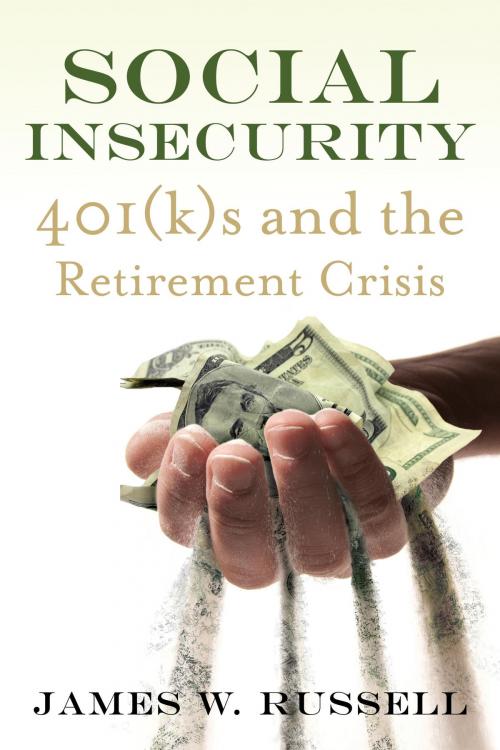Social Insecurity
401(k)s and the Retirement Crisis
Business & Finance, Personal Finance, Retirement Planning, Finance & Investing, Investments & Securities| Author: | James W. Russell | ISBN: | 9780807012574 |
| Publisher: | Beacon Press | Publication: | April 29, 2014 |
| Imprint: | Beacon Press | Language: | English |
| Author: | James W. Russell |
| ISBN: | 9780807012574 |
| Publisher: | Beacon Press |
| Publication: | April 29, 2014 |
| Imprint: | Beacon Press |
| Language: | English |
**How 401(k)s have gutted retirement security, from charging exorbitant hidden fees to failing to replace the income of traditional pensions
Named one of PW's Top 10 for Business & Economics**
A retirement crisis is looming. In 2008, as the 401(k) fallout rippled across the country, horrified holders watched 25 percent of their funds evaporate overnight. Average 401(k) balances for those approaching retirement are too small to generate more than $4,000 in annual retirement income, and experts predict that nearly half of middle-class workers will be poor or near poor in retirement. But long before the recession, signs were mounting that few people would ever be able to accumulate enough wealth on their own to ensure financial security later in life. This hasn’t always been the case.
Each generation of workers since the nineteenth century has had more retirement security than the previous generation. That is, until 1981, when shaky 401(k) plans began replacing traditional pensions. For the last thirty years, we’ve been advised that the best way to build one’s nest egg is to heavily invest in 401(k)-type programs, even though such plans were originally designed to be a supplement to rather than the basis for retirement.
This financial experiment, promoted by neoliberals and aggressively peddled by Wall Street, has now come full circle, with tens of millions of Americans discovering that they would have been better off under traditional pension plans long since replaced. As James W. Russell explains, this do-it-yourself retirement system—in which individuals with modest incomes are expected to invest large sums of capital in order to reap the same rewards as high-end money managers—isn’t working.
Social Insecurity tells the story of a massive and international retirement robbery—a substantial transfer of wealth from everyday workers to Wall Street financiers via tremendously costly hidden fees. Russell traces what amounts to a perfect swindle, from its ideological origins at Milton Friedman’s infamous Chicago School to its implementation in Chile under Pinochet’s dictatorship and its adoption in America through Reaganomics. Enraging yet hopeful, Russell offers concrete ideas on how individuals and society can arrest this downward spiral.
**How 401(k)s have gutted retirement security, from charging exorbitant hidden fees to failing to replace the income of traditional pensions
Named one of PW's Top 10 for Business & Economics**
A retirement crisis is looming. In 2008, as the 401(k) fallout rippled across the country, horrified holders watched 25 percent of their funds evaporate overnight. Average 401(k) balances for those approaching retirement are too small to generate more than $4,000 in annual retirement income, and experts predict that nearly half of middle-class workers will be poor or near poor in retirement. But long before the recession, signs were mounting that few people would ever be able to accumulate enough wealth on their own to ensure financial security later in life. This hasn’t always been the case.
Each generation of workers since the nineteenth century has had more retirement security than the previous generation. That is, until 1981, when shaky 401(k) plans began replacing traditional pensions. For the last thirty years, we’ve been advised that the best way to build one’s nest egg is to heavily invest in 401(k)-type programs, even though such plans were originally designed to be a supplement to rather than the basis for retirement.
This financial experiment, promoted by neoliberals and aggressively peddled by Wall Street, has now come full circle, with tens of millions of Americans discovering that they would have been better off under traditional pension plans long since replaced. As James W. Russell explains, this do-it-yourself retirement system—in which individuals with modest incomes are expected to invest large sums of capital in order to reap the same rewards as high-end money managers—isn’t working.
Social Insecurity tells the story of a massive and international retirement robbery—a substantial transfer of wealth from everyday workers to Wall Street financiers via tremendously costly hidden fees. Russell traces what amounts to a perfect swindle, from its ideological origins at Milton Friedman’s infamous Chicago School to its implementation in Chile under Pinochet’s dictatorship and its adoption in America through Reaganomics. Enraging yet hopeful, Russell offers concrete ideas on how individuals and society can arrest this downward spiral.















